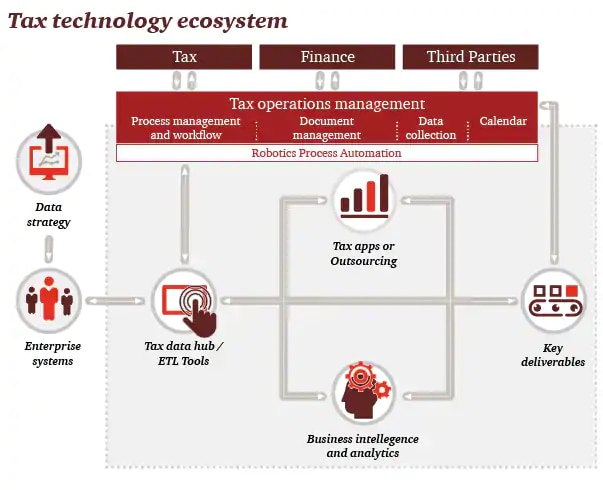{{item.title}}
{{item.text}}

{{item.text}}
Managing tax in a dynamic and digital world

Bringing together tax function design, technology and compliance delivery to help you understand and meet your current and future challenges head-on.
The tax function is under constant pressure to deliver more with less. Internal cost pressures and the demand for greater business insights against the backdrop of meeting increasing tax compliance demands in shorter time frames is resulting in the need for tax functions to chart a course of continuous improvement making the most of the latest technology developments.
With the focus global tax authorities are placing on clients to manage tax risk it’s essential to deliver efficiencies while ensuring the overall control environment is effective. Our approach to this issue is to look holistically at the building blocks that make up a tax function and develop a change roadmap that brings together these components in a coherent manner.
Tax Function of the Future: What KPIs are driving the Tax function today
How should success be measured? We will explore established, as well as new, innovative key performance indicators (KPIs) that organisations can use to evaluate how well the Tax function is performing in today’s environment.
Access the report (PDF 1mb)
Technology is driving and enabling change throughout business. Whether through the improvement of data quality or the automation of processes, technology is at the forefront of transforming the Tax function into an efficient business enabler.
The modern Tax function will have a defined technology strategy which will be aligned with related parts of the business. The Tax function can then integrate technology into their overall strategy with a clear roadmap for delivery either by implementing new technology or leveraging existing technology.
We can support you on this journey to ensure that you’re not left behind.
Tax Technology Ecosystem
Speak to us about how the tax technology ecosystem could work in your organisation.
A Tax function’s ability to deliver value depends on how well it’s able to adjust to today’s ever evolving regulatory changes, while supporting the company’s business strategy. Too many corporate Tax functions are struggling to address operational ineffectiveness, or may have been impacted by a recent merger or acquisition, and senior executives are taking notice.
Forward-thinking tax departments are conducting thorough current-state assessments that provide a road map of specific actions, cost, and relative priorities for the tax function to consider improving efficiency. These assessments take into account the current operational state, culture, and realistic appetite for change and are often scaleable.
We can provide flexible, but thorough, solutions to help improve your Tax function’s performance while reducing your risk.
Spotlight: Tax operating models - Technology disruption in sourcing decisions
In this third spotlight publication, we focus on various operating models that are available to enhance the Tax function from a sourcing perspective.
Access the report (PDF 768kb)
Many companies are rethinking their approach to domestic and global compliance and reporting by taking a closer look at their technology, processes, resources, and service providers. Leading tax functions are using co-sourcing/outsourcing as a critical component of Tax function strategy, and as a means to better align Tax function investments and use of talent with organisational goals.
We can work with you to:
Our experience and scalability allows us to customise and adapt our delivery model to align with your broader business goals.
Integrated Global Compliance Services (IGCS)
IGCS is our web-based portal designed to collaborate with you around the world, including effective exchange of data sources, transparent review of deliverables, and real-time access to status, workflow, deliverables, and critical information.
Changes to tax laws, new accounting standards and increased scrutiny of how much tax organisations are paying, means that it is more important than ever that your organisation is confident the tax numbers disclosed in your financial statements are accurate.
Early intervention into areas of complex tax accounting can help reduce last minute financial statement adjustments and discussion time with your auditor.
We can help you develop fit for purpose and well managed tax accounting processes.
Tax Function of the Future: Driving value through tax reporting
In this publication we turn our attention to enhancing the financial statement tax provision and tax return compliance processes (collectively, ‘tax reporting’ processes).
Access this publication (PDF 1mb)
Tax authorities and other stakeholders expect Tax functions to be able to demonstrate, with evidence, that they have operated in an effective and efficient way. They must be able to show, often via a formalised tax control framework and testing programme, that tax risk is mitigated to an acceptable level and tax opportunities have been taken in line with the organisation’s overall attitude to reputational and compliance risk.
Increasingly managing tax is not a purely technical challenge and the skills required also include technology awareness, project management, leadership, and communication with the wider business in a way that they understand.
We can help you meet these challenges today.
Tax Management Maturity Model (T3M)
Perform a current state review of tax management across your business using our Tax Management Maturity Model (T3M).
A key challenge for companies in the current environment is to consider how best to respond to a landscape which continues to evolve. Increased attention from stakeholders around tax is driven by a number of factors including media headlines, pressure from campaign groups and the public, and changes in regulation (e.g. public tax strategy and country-by-country reporting). Some companies are adopting a reactive approach while others are being more strategic, considering transparency, to whom and for what purpose.
We can help you to develop your thinking in this area.
Paying Taxes 2018
In-depth analysis on tax systems in 190 economies.
Finance transformations represent risk and opportunities for tax functions. Generally there are two types: organisational change and finance system change. Either of these generic change programmes will impact on the Tax function's ability to continue to remain tax compliant, as inevitably the data, systems and processes which tax rely on to deliver tax compliance and reporting will be impacted.
We can support Tax functions to fully engage with the finance transformation and position itself as a primary customer of the finance transformation programme.
Tax Function of the Future: Tax as a critical component in every Finance transformation
This fourth article in the series explains why it is critical for Tax to be an integral part of Finance transformation initiatives from the outset.
Access the report (PDF 965kb)
Core processes and routine activities can have a significant and lasting impact on the Tax function. As tax laws and accounting standards continue to evolve, Tax is challenged to look closely at how data and related documents are received, processed, and ultimately retained, while continuing to add value through strategic decision making.
Technology vendors have responded to these changing tax requirements by developing solutions with varying approaches including automation and the leveraging of enterprise-wide data.
We can work with you to identify, map and transform your tax processes utilising the latest technology developments to automate where it adds value.
Spotlight: Robotic Process Automation (RPA)
RPA can have a significant impact on a Tax organisation as a result of its ability to reduce cost and redirect focus on activities that create value and job satisfaction.
Access the report (PDF 1mb)
"21 % of tax professionals surveyed spend more than 50% of their time gathering data; only 7% leverage a data warehouse/mart solution"
Although data is not a new issue for Tax it’s fast turning into one of the major enablers for future state Tax functions. Tax authorities continue to move ever closer to real time data extraction and e-auditing with new legal requirements coming thick and fast. There has never been a greater need for tax departments to be data literate.
Tax functions can be timid in their demands of data and many are experiencing an increasing workload as a disproportionate amount of time is being spent on improving base data, rather than value add activities. Couple that with an increasing need to drive efficiency and cost reduction and it’s no wonder data has found its way onto the list of the top five priorities of the largest organisations.
We can help you improve the speed and quality of the data your Tax function receives.
Unlocking actionable insight from enterprise data can be a challenging problem especially at large volumes and in complex business landscapes. Typically tax functions spend more than 50% of their time gathering tax data, while spending less than 30% of their time on strategic tax analysis (according to "Tax technology: Creating a strategic asset", a 2013 joint PwC-Manufacturers Alliance for Productivity and Innovation survey).
How the tax function addresses its need for quality and timely data will ultimately shape its processes and resource requirements, as well as impact its ability to contribute more strategically to the overall business. The tax function must be actively involved in the budgeting of data management and analytic projects similar to those of other functions within the enterprise. It must also participate proactively in enterprise initiatives and cannot be passive in articulating the data issues it faces.
We can help you unlock data insights in your business.
Tax Function of the Future: Unlocking the power of data and analytics
We discuss our predictions around how streamlining the data collection and management process enables the tax function to shift its focus from gathering data to analysis and strategic participation within the organisation.
Beyond legal requirements, an organisation’s tax strategy must be intrinsically linked to the commercial and overall strategic objectives of the business. Poor tax management and lack of governance can have a negative commercial and reputational impact on the business. This requires a new approach to setting a tax strategy, connecting with wider finance and operational stakeholders to define the role of tax management within the organisation.
We can help you to define your tax strategy while considering the broader debate around tax policy developments to help you respond in the most effective way.
Tax policy & administration
Our role in tax policy involves working with a wide range of stakeholders. Our global Tax network helps individuals and organisations with the tax side of their businesses and investments, such as tax compliance and tax planning.
The Tax Function of the Future publication examines the main drivers influencing and underpinning the current challenges facing tax and how tax functions will have to adapt to keep pace and support the wider business.
Tax Administration Consulting practice supports tax administrations, intra- and inter-governmental organisations, development banks, government agencies in designing, optimising and implementing sustainable and operationally functioning, technologically advanced tax compliance infrastructures.
Tax experts at Microsoft and PwC have recently collaborated to author a new series of white papers that illustrate and discuss how tax administrations are tackling the challenges of digital transformation as a vital step in their countries’ economic growth aspirations.
{{item.text}}

{{item.text}}
